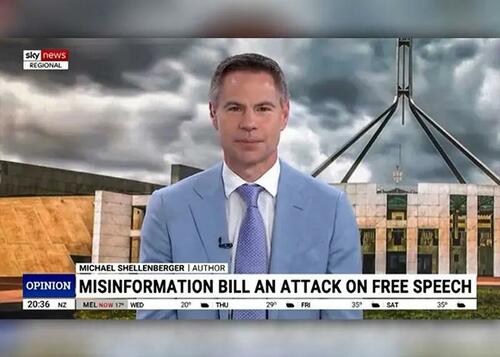
Australia’s Misinformation Bill Is Dead… For Now
Authored by Maryanne Demasi via The Brownstone Institute,
It is official.

The Australian government’s attempt to ram through legislation to combat misinformation online has been blocked after the Greens party announced it would not support the controversial bill.
“We are concerned this bill doesn’t actually do what it needs to do when it comes to stopping the deliberate mass distribution of false and harmful information,” said Greens Senator Sarah Hanson-Young.
This unexpected move is said to be the final nail in the coffin for the bill that intended to grant the media watchdog unprecedented regulatory powers to oversee digital content and determine what is ‘misinformation.’
A Domino Effect
During this week, an interesting display of parliamentary dynamics unfolded as an array of Senators announced they would oppose the bill, one by one.
Senators Lidia Thorpe, Tammy Tyrell, David Pocock, Jacqui Lambie, Gerard Rennick, Fatima Payman, and others declared their opposition.
Their reasons varied from concerns over government overreach, and vague definitions of misinformation, to the implications for political discourse and the potential for misuse. Each statement chipped away at the bill’s support, creating a domino effect.
An urgent call to action resulted in significant public outcry. Australians, concerned about their digital rights, flooded senators with emails, petitions, and social media campaigns.
The sheer volume of these communications likely played a crucial role in shaping the Senators’ views.
The vigorous debate also garnered international attention.
Michael Shellenberger, an American author and free speech campaigner, visited Australia to warn that these “totalitarian” laws would have implications for democracy, and blur the line between regulating harmful content and stifling dissent.

Nov 20, 2024 – Michael Shellenberger on Sky News Australia
According to Shellenberger, misinformation should be countered with more and better information, not through suppression or censorship.
Elon Musk, whose influence in the digital sphere is undeniable, especially after taking the helm of X, expressed similar views, and has been vocal about his disdain for what he perceives as “overreach” in digital governance, labelling the failed bill as “fascist.”
Digital ID for Under 16s
It has not quelled the government’s enthusiasm for its proposed ban of social media access for individuals under 16. This bill, which introduces a mandatory age verification process, has implications for digital identity and privacy.
The rapid legislative push on Thursday only allowed a 24-hour window for public submissions, a move to fast-track the controversial legislation without due public scrutiny.
The bill would require all Australians to undergo identity verification to use social media, raising alarms about the collection and potential misuse of personal data. The process could involve gathering biometric data, posing a risk for data breaches or misuse.
Today, Musk described the legislation as a “backdoor way to control access to the internet,” which promises to punish platforms, including X, with steep fines if they allow children under age 16 to hold social media accounts.
The combination of these legislative proposals (the misinformation bill, and the digital ID for under-16s), paints a picture of a government intent on tightening control over what you can say and read online.
What Happens Now?
After this week’s news, the Labor government must now retreat and reassess.
It could decide to abandon the legislative approach altogether and focus on other means like public education campaigns or working with social media platforms on voluntary codes of practice. But this is unlikely.
The government will most probably go back to the drawing board, either to revise the bill with more stringent protections for free speech or to explore alternative, less direct methods of addressing misinformation, hoping to revive the bill in the new year.
Republished from the author’s Substack
Tyler Durden
Thu, 01/02/2025 – 19:15














